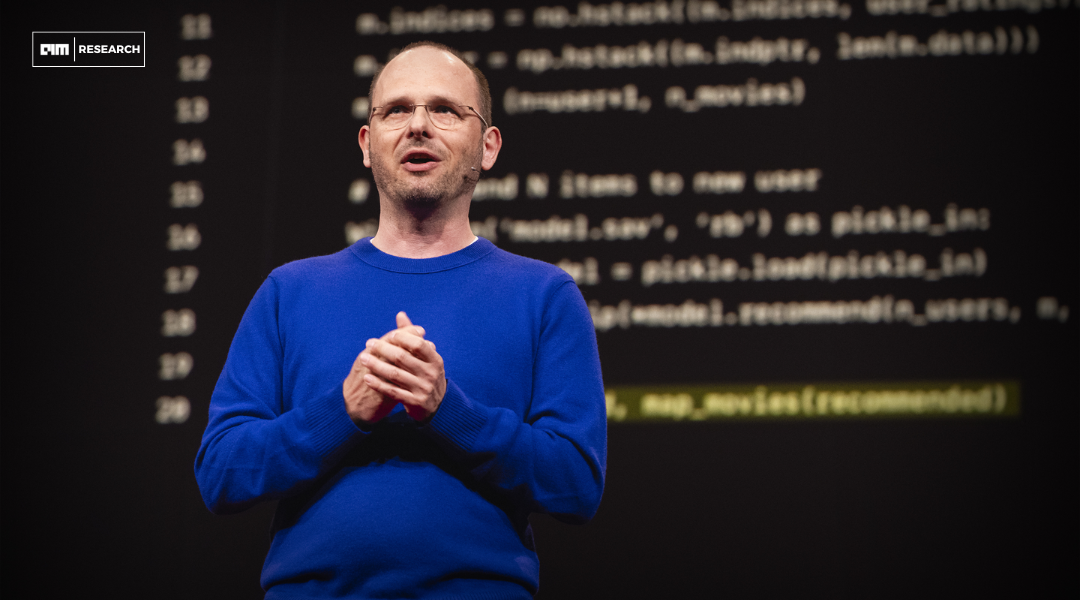

Under the leadership of CEO Thomas Dohmke, GitHub’s Copilot has become a flagship example of how generative AI can radically improve developer productivity by suggesting code in real time, automating repetitive tasks, and reducing time spent on boilerplate. It’s been described as “autocomplete on steroids,” and has sparked a wave of innovation across developer tools and enterprise software.
In a recent podcast by Entrepreneurship & Opportunities, he strongly emphasised that every child should learn coding. He thinks coding should be taught in school in the same way that fundamental skills like physics, geography, literacy, and math are taught. On the podcast, he clearly stated that coding is a fundamental skill due to the pervasive nature of software. Software already dominates our daily lives, making it difficult to live, travel, or even wake up without it.
Thomas Dohmke, who apart from being a GitHub CEO, essentially identifies himself as a developer has been writing software since the early 1990s. GitHub has been at the forefront of AI code generation. It began working on GitHub Copilot in June 2020 after GPT-3 was introduced. Dohmke believes AI is dramatically changing how people think about software development. Therefore instead of relying completely on AI for code generation, people should consider AI as an aid to software development.
AI tools such as Copilot and ChatGPT can generate basic code from prompts, including simple web pages or small Python games, while existing developers can significantly focus on complex tasks, that requires critical thinking. However, initial concepts often prove more intricate to execute, causing projects to lengthen or stall. AI facilitates this ambition by accelerating the implementation process. Frequent backlogs comprising both new feature development and technical debt, such as outdated code requiring refactoring on part of the developers and that’s when AI comes into rescue as it has the potential to alleviate this workload, certainly increasing developer productivity by 10%, 20%, or even 50%.
From his own experiences, Dohmke knows Copilot can bring many other benefits. The truth is many programmers he knows have also felt the pain of abandoning half-finished projects, he said in the YouTube interview, “because you ultimately realize it’s much more complex than you thought, and it’s not worth spending the time on it. As he puts it, “AI helps us to realize the dream of taking an idea and implementing it much faster.”
Despite advancements, the notion of a single prompt creating intricate systems like GitHub remains distant. Constructing such complex systems requires numerous architectural decisions that go beyond selecting a programming language or cloud provider. AI agents are not yet capable of making all these complex decisions to build a viable business application that finds product-market fit, offers a great user experience, and generates profit. Therefore, engineers are still needed to perform core engineering tasks, exercise their craft, apply systems thinking and design, and build great applications and for that its absolutely essential for them to learn “coding.”
He continued, “the goal is to provide tools that make developers more productive and happier while writing code.” A significant advancement in Copilot’s capabilities is the introduction of Agent Mode. This feature allows Copilot to autonomously perform multi-step tasks, such as analyzing codebases, proposing edits, running tests, and responding to errors, effectively acting as a collaborative partner in the development process. Additionally, Next Edit Suggestions anticipate the next logical edit in your code, streamlining the development process by reducing cognitive load. Copilot Workspace further enhances collaboration by assisting in refining pull requests, validating changes, and integrating reviewer suggestions. These features collectively aim to increase developer productivity by alleviating the workload associated with repetitive tasks and technical debt.
AI’s superpower as he mentioned is to provide man assistance with “infinite patience” that doesn’t judge, always provides an answer, and accepts correction. Despite these advancements, Dohmke acknowledges that AI is not a replacement for human developers. While there has been a considerable amount of development in AI-generated coding, otherwise known as “vibe coding,” it simply enables the users to describe their intentions in plain language, while it democratizes software creation, making it accessible to those without extensive programming knowledge.
Dohmke previously argued that while critics fear AI coding will replace human developers, history shows that advancements in abstraction have always enabled developers to achieve more. Despite understandable anxiety, developers over the years have consistently leveraged automation, like scripts and workflows, to innovate into new domains.
With the rise of AI agents, the objective is increasingly straightforward: define a task, delegate execution to an intelligent system, and allow it to autonomously carry out the work, sometimes over hours or days before verifying the final output. Yet even as these systems grow more capable, human developer’s oversight remains indispensable.
As Dohmke emphasized, continuous learning is crucial for anyone in software development; you are “never done with learning.”
📣 Want to advertise in AIM Research? Book here >

Cypher 2024
21-22 Nov 2024, Santa Clara Convention Center, CA
A Vendor Briefing is a research tool for our industry analysts, and an opportunity for a vendor to present its products, services and business strategies to analysts who cover the vendor specifically or a related technology or market.
AIM Research encourages technology vendors and agencies to brief our team for PeMa Quadrants, when introducing a new product, changing a business model, or forming a partnership, merger, or acquisition.


